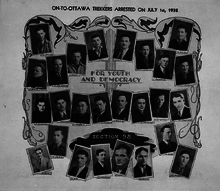Section 98

Section 98 (s. 98) of the Criminal Code of Canada was a law enacted after the Winnipeg General Strike banning "unlawful associations." It was used in the 1930s against the Communist Party of Canada.
After the Winnipeg General Strike of 1919, Arthur Meighen, Minister of Justice in Robert Borden's government, introduced an amendment to the Criminal Code (Canada) that was passed by Parliament, which read:
Any association...whose professed purpose...is to bring about any governmental, industrial or economic change within Canada by use of force, violence or physical injury to person or property, or by threats of such injury, or which teaches, advocates, advises or defends the use of force, violence, terrorism, or physical injury to person or property...in order to accomplish such change, or for any other such purpose..., or which shall by any means prosecute or pursue such purpose...or shall so teach, advocate, advise or defend, shall be an unlawful association.[1]
The law was extremely broad and carried a penalty of up to 20 years in prison. It was used throughout the 1920s and early half of the 1930s to harass Communists, other left parties and organizations, and labour unions generally.[2] The most famous use of Section 98 was in a crackdown designed to "strike a death blow at the Communist Party."[3] The Royal Canadian Mounted Police and the Ontario Provincial Police rounded up eight leaders of the Communist Party on 11 August 1931, who were subsequently convicted under the law and sentenced for up to five-year prison terms. In the years after the conviction, public opinion turned in favour of the Communists and against the law, which was opposed by liberals and moderate leftists as well as far-left organizations like the Canadian Labour Defence League, a Communist legal defence committee. As a result of public opposition, the Communists were released early from jail and the law was repealed in 1936 following the election of Mackenzie King in 1935.
Opposition to Section 98 was an important campaign for crystallizing an early civil rights movement within an otherwise fractured left-wing in Canada.[4] Although the law was repealed, it served as the model for the Defence of Canada Regulations under the War Measures Act to suppress aliens and dissenters during the Second World War and during the October Crisis of 1970.[2]
What is not clarified in this article is a general history of Communism in Canada and how that applies to the creation of Section 98 of the Criminal Code. All foreign Communist Parties were fronts for the Communist International in Moscow. They deliberately sent Communist agitators to infiltrate Labour Unions ( which do not have to be Socialist OR Communist ). Revelations of the confirmed and factual infiltration of Western Government's and Society as a whole by operatives of the Soviet Union abound. This had been going on since 1920 and was proven in the defection of Soviet GRU, NKVD and KGB agents as well as their operatives within the Communist Party of Great Britain, Canada, Australia and the United States. Prime examples being the defection of Kivitsky, Gouzenko and Elizabeth Bentley of the Communist Party of the United States as well as a cavalcade of others between 1939 and 1965. Solid evidence of the massive extent of Communist infiltration of the west and all aspects of Government, Military, Science, Education, Intelligence, Labour Unions etc. are revealed by these defectors and the revelations in the US Signals Intelligence Service Venona Papers. (Reference; Library and Archives Canada Record Group 24, R13880, Igor Gouzenko Article Vol 16, No.7 and Sir Roger Hollis & Igor Gouzenko. MG26, J4, Volume 417, Mackenzie King Papers. Venona project, Elizabeth Bentley.) One can argue quite effectively that the "harassment" and "suppression" of these people was justified once one does the research and notes the damage caused to international security and the safety of the FREE world.
References
- ↑ Berger, Thomas (1981). Fragile Freedoms: Human Rights and Dissent in Canada. Toronto: Clarke, Irwin & Company. pp. 132–133. ISBN 0-7720-1358-6.
- 1 2 Berger, Thomas (1981). Fragile Freedoms: Human Rights and Dissent in Canada. Toronto: Clarke, Irwin & Company. p. 135. ISBN 0-7720-1358-6.
- ↑ "1931 Communist Party Trial". Socialist History Project. Retrieved 2007-01-25.
- ↑ Clément, Dominique (May 2004). ""'It is Not the Beliefs but the Crime that Matters': Post-War Civil Liberties Debates in Canada and Australia,"". Labour History (86). Retrieved 2007-01-26.